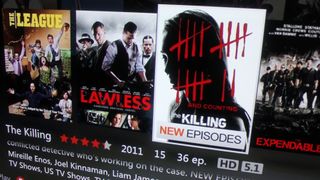The future of TV is app based and iPlayer is a shining example, says Netflix
Channel? What's a channel, mummy?

Netflix has revealed why it believes it is in the best position to bring television to the masses in the future, believing it is inevitable that TV will be predominately internet and on-demand based.
The updated statement to its investors, titled Netflix Long Term View, begins with a backhanded compliment about linear TV then sets out Netflix's hope for the future of television.
"While hugely popular, the linear TV channel model is ripe for replacement," explains the statement. "If we could look into the future at the ways that people access entertainment, we would no doubt see a very different image than we see today - mind-blowing video quality, a proliferation of screens, yet-unimagined natural user interface, and an unbelievable range of choice."
Changing the app
This 'different image' is the proliferation of apps, instead of channels - a view that backs what Netflix said back in April.
Netflix points to iPlayer as a shining example of this done well, noting that: "The BBC iPlayer app in the UK provides a rich and popular on-demand interface for a wide range of BBC programming.
"The BBC is already starting to program more for its iPlayer app than for its linear channels, given the large and growing viewing on the iPlayer."
Netflix also hopes that its continued push into original programming will make it one of the main sources for content in the future and in its statement it once again aligns itself with HBO, but believes it can be better than the premium TV network.
Get daily insight, inspiration and deals in your inbox
Get the hottest deals available in your inbox plus news, reviews, opinion, analysis and more from the TechRadar team.
"At a high-level, HBO-linear is our closest domestic comparison, and they have about 30 million domestic members," it explains.
"We currently have fewer original series and Pay1 movies than HBO. But we have more content, much more viewing per member, a broader brand proposition, are on-demand, on all devices, and are less expensive, so we estimate that we can be two to three times larger than current linear-HBO."
An update to the statement notes that it is now a "movie and TV series network" and that its rivals aren't just other networks offering similar shows (such as LoveFilm in the UK) but "video games, web browsing, magazine reading, video piracy, and much more".
Producing and promoting
One of the ways it plans to push its TV efforts is by putting $2 billion worth of funding into its original programming, saying that, "with each original, we learn more about what our members want, about how to produce and promote effectively, and about the positive impact of originals on our brand."
This is a little boring compared to how Netflix looks for non-original programming, which involves a sneaky look at what is popular in the piracy stakes.
As for Netflix's view of TV on the whole in the future, its crystal ball reckons streaming will be the main way 4K content will enter homes, tablet viewing will increase and TV Everywhere (a verification service that allows online viewing) will smooth out online and traditional viewing.
That and we will all be watching television from space. Probably.
- Is Netflix the best for streaming service for you? Find out here
Via The Verge
Marc Chacksfield is the Editor In Chief, Shortlist.com at DC Thomson. He started out life as a movie writer for numerous (now defunct) magazines and soon found himself online - editing a gaggle of gadget sites, including TechRadar, Digital Camera World and Tom's Guide UK. At Shortlist you'll find him mostly writing about movies and tech, so no change there then.
Most Popular


